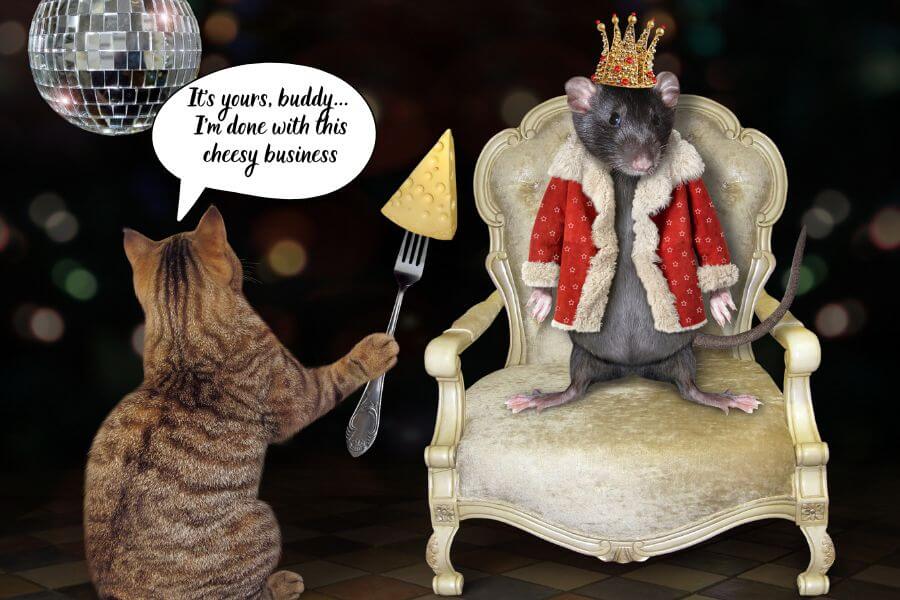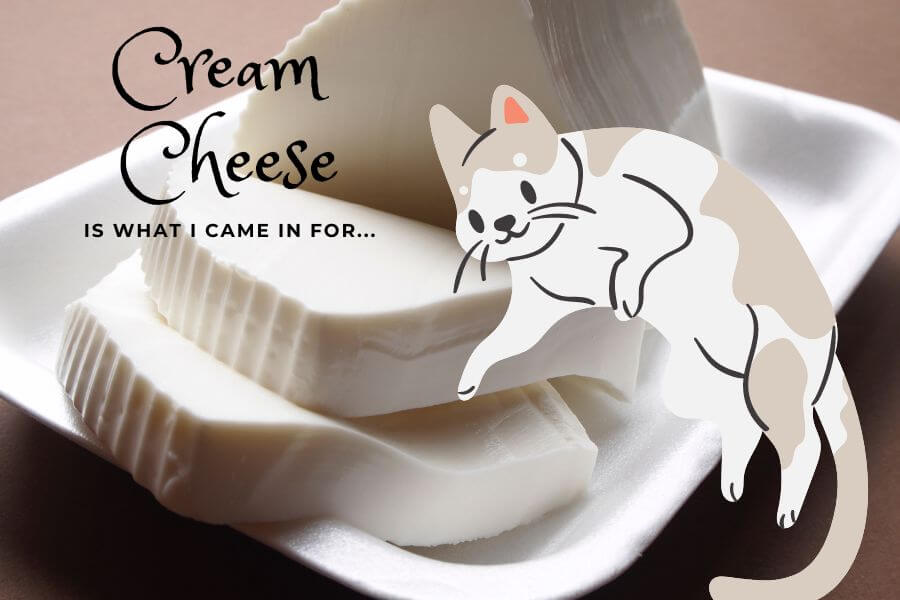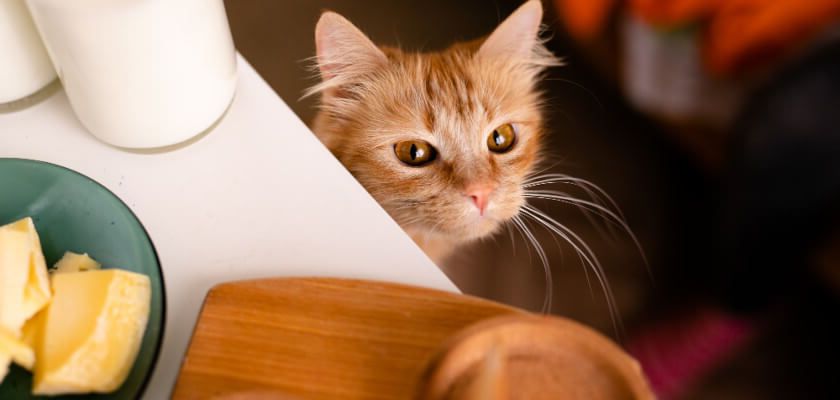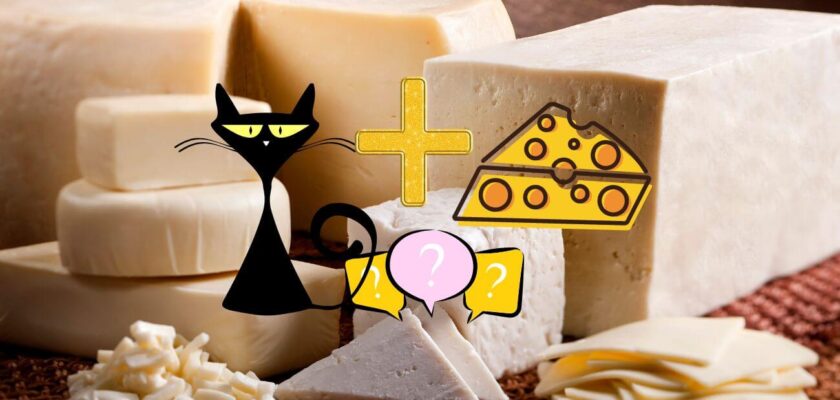Long Story Short
- Most cats are lactose intolerant, and that means = no cheese. 😿
- Eating a lot of cheese will result in some stinky business (both poop and vomit, yikes). 🙀
- BUT, a tiny piece, or a stolen bite, is very unlikely to cause any trouble. 😼
- Not all cheeses are created equal. Cheddar, mozzarella, and Parmesan are among the more acceptable options. Cottage cheese and blue cheese should be avoided. 😸
- Lactose-free cheeses and plant-based cheese substitutes are safer concerning the lack of lactose. But they can also be too fat for kitties. 😾
- Stick to safe treats like homemade chicken or fish treats or store-bought options specifically made for cats. 😸
Can Cats Eat Cheese?

Before we start exploring the cheesy realm, let’s get one thing straight – cats are lactose intolerant. Yep, you heard it right. They lack the enzyme necessary to digest lactose (the sugar found in milk). It’s like they missed the memo on that one. So, can cats eat cheese? Well, they can, but they shouldn’t.
Eating cheese can lead to some unpleasant side effects for our feline friends. Think vomiting and diarrhea. Not the most glamorous way to spend the day, right? The severity of these symptoms depends on how much cheese they’ve gobbled up and how sensitive their delicate stomachs are feeling.
Can Cats Eat Cheese of Any Type?

Now, let’s embark on our cheese adventure! Cue the dramatic music. Remember, cats are lactose intolerant, but not all cheeses are created equal. So, without further ado, let’s see which cheeses get the green light and which should be avoided like a bath on a rainy day.
Cheddar: The Cool Cat Cheese
Is cheddar the cool cat of cheeses? Well, it’s certainly one of the more acceptable options for our feline friends. Sharp cheddar contains a mere 0.4 to 0.6 grams of lactose per ounce. So, if your curious cat snags a small piece, they’ll probably be just fine. But watch out if they go on a cheese frenzy – digestive issues might just come knocking.
Mozzarella: The Melty Delight
Next up, we have mozzarella. This cheese can be a bit of a hit or miss in terms of lactose content, ranging from 0.08 to 0.9 grams per ounce. So, if your whiskered companion nibbles on a small piece, they should be in the clear. But remember, keep that pizza slice out of reach. The cheese might be okay, but those sneaky spices can cause trouble!
Parmesan: The Mighty Warrior
Ah, the Italian warrior of cheese: Parmesan! This hard cheese is a favorite for many, and the good news is that it contains minuscule amounts of lactose (less than 0.5 grams per ounce). So, if your mischievous kitty can’t resist a few flakes, fret not. They’re unlikely to devour a huge chunk of this flavorful cheese.
Cottage Cheese: Proceed with Caution
Now, here’s a cheese that requires a bit more caution – cottage cheese. Made from curdled milk, it packs a lactose punch with up to 4 grams per ounce. Yikes! This creamy treat can lead to an upset tummy in cats, causing some uninvited vomiting and diarrhea. So, it’s best to keep the cottage cheese away from those curious paws.
Other Cheeses: A Mixed Bag
Soft cheeses like Brie can be a bit of a mixed bag when it comes to lactose content. If your cat decides to sample some, keep a close eye on them for any potential symptoms. Remember, our feline friends are unique individuals with their own quirks, just like us!
Cream Cheese: A Lactose Light Option
Let’s not forget about the creamy goodness of cream cheese! While it contains lactose, the amount is lower compared to many other cheeses. Only 0.1 to 0.8 grams per ounce, to be exact. So, if your sneaky furball manages to snag a lick, they should be fine.
Blue Cheese: A Feline Faux-Pas
Now, let’s talk about blue cheese. This one falls on the higher end of the lactose spectrum, with about 2 to 4 grams per ounce. Not ideal for our lactose-intolerant friends. But wait, there’s more! The mold found in blue cheeses can be downright toxic to cats. So, keep those paws away from the blue cheese platter at all costs!
Editor’s Note 😸
Picture this – my friend’s cat (Benny), a chunk of gorgonzola, and a whole lot of regret. It smelled delicious, but oh, the consequences! Poor Benny was lying helplessly on the floor, looking up at its owner with that guilty expression only a cat can master. He meowed in distress and ran away to hide under the bed. And let’s just say, his litter box was extra stinky that day. Lesson learned: no gorgonzola for our feline friends!
How About Lactose-Free Cheeses?
Ah, the elusive lactose-free cheeses. Can cats enjoy these? Well, they do contain trace amounts of lactose, so some kitties may tolerate them just fine. However, it’s important to note that cats shouldn’t make cheese a regular part of their diet. Why, you ask? It’s because cheese is rich in casein, a protein that can interfere with nutrient absorption. We want our fur babies to get all the essential goodies from their food!
Can Cats Eat Cheese Substitutes Made from Plants?
Can cats eat cheese substitues? These plant-based alternatives are free of lactose and casein, making them potentially safe for cats in small amounts. But—and it’s a big but—be mindful of the specific plants used in production. If the non-dairy cheese contains nuts or coconuts, it might be too fatty for our feline friends. Besides, cats are true carnivores at heart, so our plant-based human food isn’t really cut out for them.
It’s Better for Cats Not to Have Cheese – Stick to Safe Treats

So, here’s the deal – cheese should be treated like that fancy bottle of perfume you save for special occasions. It’s not an everyday indulgence for our furry friends. Instead, let’s explore some safe treats that will have your cat purring with delight!
You can whip up homemade cat treats using simple ingredients like chicken or fish. The kitchen is your playground! And if cooking isn’t your thing, fear not – there are plenty of store-bought options that are safe and tasty for cats. Freeze-dried meats and catnip treats are always a hit.
In conclusion, can cats eat cheese? Not really. Even a few tiny pieces of cheese can wreak havoc on our furry companions’ delicate digestive systems (and cause a whole lot of trouble). If your cat happens to munch on some cheese, keep a vigilant eye out for vomiting, diarrhea, or any other signs of distress. If these symptoms arise, don’t hesitate to reach out to your veterinarian for guidance.
Frequently Asked Questions: Curiosity Meets Cheese

What Cheese Is Safe for Cats?
Most types of cheese are safe for cats in moderation, as long as they contain no added ingredients or flavorings. Plain cheddar, Swiss, or mozzarella are among the safest options for our whiskered pals.
Why Does My Cat Like Cheese?
Ah, the allure of cheese! Cats have a keen sense of smell and can detect the pungent odor of cheese from miles away—or so it seems. The familiar scent and taste of cheese may simply bring them comfort and joy. After all, who can resist the tantalizing aroma of cheese?
Can You Give Milk to Cats?
Contrary to what we see in cartoons, cats really shouldn’t drink milk. Most of them are lactose-intolerant, so that’s a no-go. And for those who aren’t, milk doesn’t offer any nutrition. Why bother?
Can I Give My Cat a Little Bit of Cheese?
You can give your cat a small cube, once every few weeks, yes (as long as it’s plain and your cat is tolerant to lactose). Just keep the portion size in check and observe their reaction. We don’t want any cheese-induced tummy troubles!
Similar Posts:
- Can Dogs Eat Mozzarella Cheese Safely?
- Can Dogs Eat Cheese? Is It Safe for Dogs?
- Do Cats Drink Milk? Do Cats Like Milk? The Truth About Whether You Can Give Your Cat Milk or Not
- Can Dogs Eat Mac and Cheese? | Health Risks and Alternatives
- Can Dogs Eat Sour Cream? How Much Sour Cream Can You Give Your Dog?
- Can Cats Eat Yogurt? Is Dairy Safe for Cats?
- Can Dogs Eat Whipped Cream? Is Starbucks Puppuccino Bad for Dogs?
- Can Cats Eat Ice Cream? Do Kittens Get Brain Freeze?

